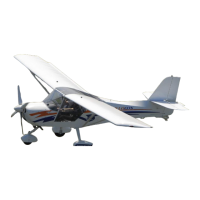
Do you have a question about the Apollo FOX and is the answer not in the manual?
| Manufacturer | Apollo Ultralight Aircraft |
|---|---|
| Type | Light Sport Aircraft |
| Seating capacity | 2 |
| Height | 2.3 m |
| Engine | Rotax 912 |
| Stall speed | 65 km/h |
| Service Ceiling | 3, 000 m |
Purpose of the handbook, pilot's responsibility, and manufacturer's liability.
Aircraft approval status by Hungarian Civil Aviation Authority and Type Certificate details.
Explanation of WARNING, CAUTION, and NOTE symbols for safety emphasis.
Description of the Apollo Fox as the first aerodynamically controlled microlight by Halley Ltd.
Details the propeller type, material, and pitch options for the Apollo Fox.
Specifies the Rotax 912 UL-ULS engine, its features, and lubrication system.
Presents dimensional drawings of the Apollo Fox from top, side, and front views.
Lists detailed physical dimensions and measurements of the aircraft.
Describes the landing gear configuration, wheels, brakes, and steerable nose wheel.
Covers operating limitations, instrument markings, and basic placards for safe aircraft operation.
Summarizes critical speed limits, including VNE, VNO, VA, VFE, VSO, and VS1.
Details the markings on the airspeed indicator (white, green, yellow arcs, red line) and their significance.
Explains the color-coded ranges for Tachometer, Oil Temperature, Cooling Liquid Temperature, Oil Pressure, and Fuel Quantity.
Provides detailed specifications for the Rotax 912 UL-ULS engine, including power, speed, temperatures, and consumption.
Lists empty weight, max take-off weight, max landing weight, fuel weight, and baggage limits.
Defines the empty weight CG position and the required flight CG limits.
Details payload values, weighing procedures, and safe payload determination for various configurations.
Presents information on maximum positive (+4g) and negative (-2g) load factors.
Specifies permissible maneuvers (e.g., 60° bank turn) and prohibits aerobatics, stalls, and spins.
Outlines permitted wind speed components for take-off and landing.
Specifies number of seats, minimum/maximum crew weight, and maximum permissible cockpit load.
Defines permissible flight operations as VFR day flights, prohibiting IFR and cloud flying.
Describes the fuel system components, tank capacities, and fuel specification.
Details the oil system, including tank capacity, charge, minimum quantity, and specification.
Lists key operational limitations and prohibitions for the aircraft.
Illustrates the instrument panel layout with numbered components and their functions.
Details procedures for normal aircraft operation, from pre-flight to post-flight checks.
Outlines procedures for handling various emergencies, including engine failure and fires.
Provides data on airspeed calibration, minimum flying speeds, and take-off characteristics.
Details position error, minimum speed, take-off, landing, and climb performance metrics.
Covers cruise flight, endurance, grass take-off, and rain effects on flight characteristics.
Explains the purpose of supplements for aircraft fitted with non-standard equipment.
Provides a table to list inserted supplements with date, number, and title.